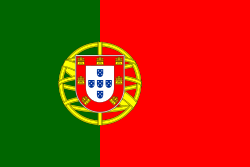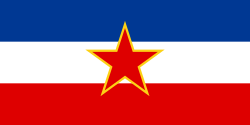Portugal–Yugoslavia relations
 From Wikipedia - Reading time: 7 min
From Wikipedia - Reading time: 7 min
Portugal |
Yugoslavia |
|---|---|
 | |
Portugal |
Yugoslavia |
|---|---|
Portugal–Yugoslavia relations (Portuguese: Relações Portugal–Jugoslávia; Serbo-Croatian: Portugalsko-jugoslavenski odnosi, Подругалско-југословенски односи; Slovene: Odnosi med Portugalsko in Jugoslavijo; Macedonian: Односите Португалија-Југославија) were historical foreign relations between Portugal and the former Yugoslavia (Kingdom of Yugoslavia 1918-1941 and Socialist Federal Republic of Yugoslavia 1945–1992). Portugal established diplomatic relations with the Kingdom of Serbia on 19 October 1917.[1] with relations continuing with the successor Kingdom of Yugoslavia. The Portuguese recognized the government in exile of this state after the German occupation of 1941.[2] The first Portuguese ambassador to Yugoslavia was Fernando Quartin de Oliveira Bastos who arrived in Belgrade in February 1941 with official residence in Bucharest.[3] Relations with the Socialist Federal Republic of Yugoslavia, which took power in 1945 after World War II, were only established in 1974 after the Portuguese Carnation Revolution.[4][5] This was because of Portuguese dictator António de Oliveira Salazar's strict anti-communism. Relations further soured during the Portuguese Colonial War as Yugoslavia provided military and other forms of aid to MPLA and other liberation movements fighting against Portugal.[6][7] The first permanent Portuguese embassy was opened in Belgrade in July 1977 with Alvaro Manuel Soares Guerra as ambassador.[8]
Country comparison
[edit]| Common name | Portugal | Yugoslavia |
|---|---|---|
| Official name | Portuguese Republic | Socialist Federal Republic of Yugoslavia |
| Coat of arms |  |
 |
| Flag |  |
 |
| Capital | Lisbon | Belgrade |
| Largest city | Lisbon | Belgrade |
| Population | 10,970,155 | 23,229,846 |
| Government | Unitary Marxist–Leninist one-party socialist republic | Socialist republic |
| Official languages | Portuguese | No official language
Serbo-Croatian (de facto state-wide) Slovene (in Slovenia) and Macedonian (in Macedonia) |
| First leader | Sidonio Pais | Joseph Broz Tito |
| Last leader | Mario Soares | Milan Pančevski |
| Religion | Catholic Catholicism (de facto), secular state (de jure) | Secular state (de jure), state atheism (de facto) |
| Alliances | EEC, NATO | Non-Aligned Movement |
References
[edit]- ^ Gerhard Schulz (1972). Revolutions and peace treaties, 1917-1920. Methuen. p. 35.
- ^ Ahmet Đonlagić; Žarko Atanacković; Dušan Plenča (1967). Yugoslavia in the Second World War. Međunarodna štampa--Interpress. p. 41.
- ^ "Bilateral Relations Serbia". Ministry of Foreign Affairs (Portugal). Retrieved 7 March 2022.
- ^ Lester A. Sobel, Christ Hunt (1976). Portuguese revolution, 1974-76. Facts on File. p. 76. ISBN 0-87196-223-3.
- ^ Jorge Santos Carvalho (2012). As Relações Jugoslavo-portuguesas (1941-1974) [Yugoslav-Portuguese relations, (1941-1974)] (in Portuguese). Coimbra University Press. ISBN 978-989-26-0146-5.
- ^ Lazić, Milorad (2019). "Comrades in Arms: Yugoslav Military Aid to Liberation Movements of Angola and Mozambique, 1961–1976". In Dallywater, Lena; Saunders, Chris; Fonseca, Helder Adegar (eds.). Southern African Liberation Movements and the Global Cold War 'East': Transnational Activism 1960–1990. Walter de Gruyter GmbH & Co KG. ISBN 9783110642964.
- ^ Jovan Čavoški (2019). ""Yugoslavia's Help Was Extraordinary": Political and Material Assistance from Belgrade to the MPLA in Its Rise to Power, 1961–1975". Journal of Cold War Studies. 21 (1): 125–150.
- ^ "Países Sérvia - Titulares" [List of Ambassadors to Serbia] (in Portuguese). Ministry of Foreign Affairs (Portugal). Retrieved 7 March 2022.
See also
[edit]- Yugoslavia and the Non-Aligned Movement
- Death and state funeral of Josip Broz Tito
- Serbia in the Eurovision Song Contest 2018
- Portugal in the Eurovision Song Contest 1990
- Foreign relations of Portugal
- Foreign relations of Yugoslavia
- Yugoslavia–European Communities relations
- Portugal–Serbia relations
 KSF
KSF

